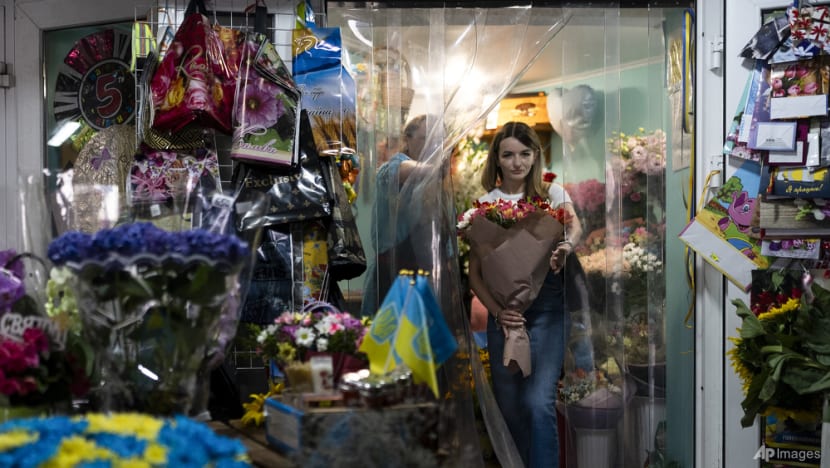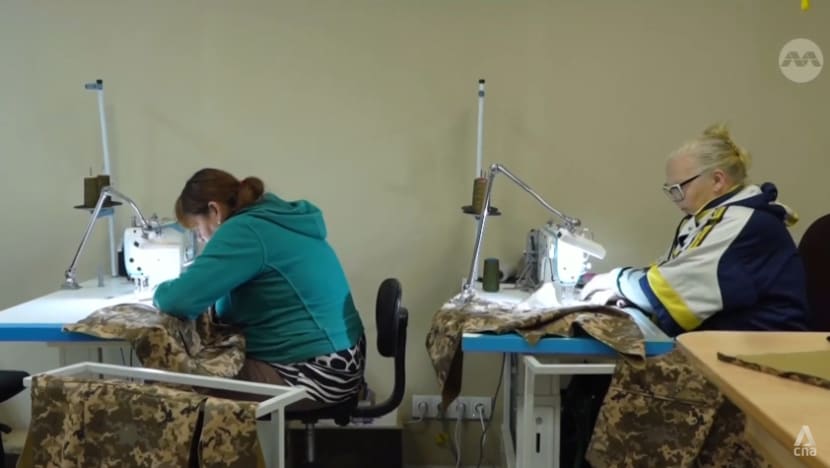Ukraine cautiously adapts to a wartime economy as businesses and consumption pick up
While Ukraine’s economic output is still considerably smaller than before the war, observers said the nation appears to be adapting and rebounding.

A woman leaves a flower shop after buying a bouquet of flowers in Kyiv, Ukraine, Wednesday, July 12, 2023. (AP Photo/Jae C. Hong)

This audio is generated by an AI tool.
KYIV: When lawyer and entrepreneur Illia Yelin set up a small factory making clothes in the eastern Donetsk region a few years ago, he planned to produce workwear for coal miners there.
But everything came to a halt when Russia began its full-scale invasion of Ukraine in February last year.
Mr Yelin left everything behind and fled to Kyiv, where he restarted his business from scratch.
“It was challenging because there were no patterns, no templates, and no technology – not even a pattern cutter. Everything was left in Donetsk,” he told CNA.
Today, he produces 200 sets of army uniforms a day that are sold in military shops across the country.
They are sewn by internally displaced women who, like Mr Yelin, have found new lives in the capital.

ADAPTING TO A WARTIME ECONOMY
Ukraine’s economy shrank by a third at the start of the war.
But as residents fled to safer parts of the country and settled into new jobs, domestic spending has since picked up.
The World Bank predicts Ukraine’s economy will expand by an estimated 3.5 per cent this year, and private consumption will grow 5 per cent.
Next year, its gross domestic product (GDP) is expected to increase by around 4 per cent.
While the growth stems from a low base after the initial months of devastation, observers said it is a sign that the country has been able to adapt to various wartime challenges.
LOCAL BUSINESSES PICK UP
A steady flow of foreign aid also helped to jumpstart local businesses.
Ms Iryna Yelisova’s kitchen furnishing firm is one of many propped up by government grants funded by foreign financial assistance.
She lost her job when parts of the Kyiv region came under Russian occupation shortly after the war started.
When Ukrainian forces later drove out Russian soldiers and liberated the cities, Ms Yelisova gathered her former colleagues to start their own firm.
This, despite an uncertain business environment and the constant threat of Russian bombardment.
“Everyone started telling me: ‘Who needs furniture right now? Everyone is saving money, not spending, because we don't know what tomorrow will bring. Perhaps tomorrow there will be another attack, and we will be forced to flee again,’” she recalled.

Ms Yelisova was undeterred, spurred by government funding and motivated by helping to rebuild war-torn homes. Within the first three months, she completed 60 projects.
“One such story was when a man from Irpin came to us. A rocket had hit his home. There was no roof, all the furniture was destroyed. Yet this person continued to live, continued to rebuild his home,” she told CNA. “Clients who shared their own stories inspired me to continue working.”
ECONOMIC RECOVERY DELICATE
However, analysts warned that the economy remains fragile and unpredictable.
“In terms of war, there are high risks both on the negative side and the positive side. Russian aggressors could invent new ways of fighting or conduct terrorist attacks like they did last year with attacks against our energy system,” said Mr Hlib Vyshlinksy, executive director at Ukrainian think tank the Centre For Economic Strategy.
“But also, on the positive side… the Ukrainian military, together with our western allies and other democratic countries, could reach a significant military advantage and push the enemy from occupied territories.”
Enormous challenges still lie ahead for Ukraine, including the costly rebuilding of the country’s devastated cities and a government deficit that will continue to balloon as the war drags on.
For clothes factory owner Mr Yelin, he remains positive his business will continue to grow, even as the conflict will soon enter its third year.
His hope is that someday, the fabrics on his factory's work stations will not just be the colours worn by soldiers on the battlefield.













